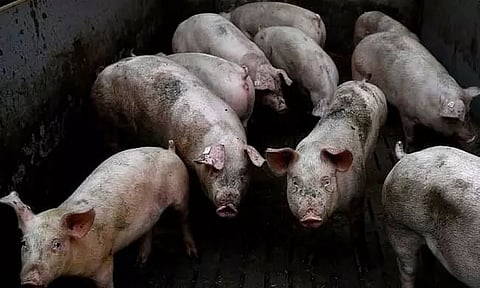
- Home
- Live Blog
- Breaking News
- Top Headlines
- Cities
- NE News
- Sentinel Media
- Sports
- Education
- Jobs

Meghalaya- After a research-based institute from Bhopal confirmed the outbreak of the African Swine Fever (ASF), the government of Meghalaya declared 10 villages from three districts of Meghalaya as the epicenter for this viral disease.
The National Institute of High-Security Animal Diseases (NIHSAD), Bhopal conducted a study based on the test result of pig samples dated 13.04.2021 and after confirmation of the outbreak of the disease as per reports, the North Eastern Regional Disease Diagnostic Laboratory (NERDDL) dated 13.04.2021 sent an email Principal Secretary of the Animal Husbandry & Veterinary Department, GHP Raju, IPS.
Under Section 6 and Section 20 of the Prevention and Control of Infectious and Contagious Diseases in Animals Act, 2009, the governor of Meghalaya in order to prevent, control and eradicate the spread of the disease declared 10 villages from three districts as 'epicenters' for the African Swine Fever (ASF).
The villages listed as epicentres for ASF are Mawlai Nongkwar, Pig Farm Nongpyiur, Thangsning, Kseh Pyndeng, Nongkseh and Lyngkyrdem from the district of East Khasi Hills, Raitong, Umran Dairy and Patarim from the district of Ri Bhoi, and Pig Farm Nongstoin from the district of West Khasi Hills.
As per the National Action Plan for control, containment, and eradication of African Swine Fever prepared by the Ministry of Fisheries, Animal Husbandry and Dairying, Government of India, restrictions have been imposed in the "infected zone" which is the area under a one-kilometer radius from the epicenter and the "Surveillance Zone" which is the area under ten-kilometer radius from the epicenter.
Restrictions in the infected zone
All pig products, be it live pigs, pig feed, pork meat, or pig-associated supplies (veterinary medicine, feed equipment, breeding tool, etc.) are prohibited to be taken out of or brought inside the infected areas. All pig-associated equipment/supplies should not be moved out of the pig sheds/pig farms.
Pig farm owners and handlers are expected to maintain hygiene and bio-security in pig farms and not allow the entry of people into farm premises. Pig farm handlers are prohibited to move from one pig farm to another and restriction of the movement of people to the infected premises is prohibited. The vehicles moving out of the infected zones will have to be cleaned and disinfected.
The pig carcass has to be deeply buried in the ground with sufficient lime cover in the infected premises itself and is prohibited from being thrown in water bodies. In case the burial of the carcass is not possible due to some reason, agencies under the control of the District Veterinary office will take care of it. Contaminated feed, slurry, swill, bedding, farm waste products, litter in infected premises to be disposed of by deep burial.
The Veterinary Officers/Rapid Response Team (RRT) must supervise the primary disinfection of infected premises while the secondary disinfection of infected premises shall be carried out by the owner in accordance with the direction of the Veterinary Officers/Rapid Response Team (RRT).
Pig markets and slaughter houses should be strictly shut down while imposing a complete ban on the slaughter of pigs and the sale of pork and pork products in Infected Zone.
Restrictions in the surveillance zone
The movement of live pigs from the surveillance zone to the infected zone is prohibited while the movement of pigs within the surveillance zone is permitted. However, a complete ban has been imposed on the inter-state and inter-district movement of pigs.
The pig carcass has to be deeply buried in the ground with sufficient lime cover in the infected premises itself and is prohibited from being thrown in water bodies.
Pig farm owners and handlers are expected to maintain hygiene and bio-security in pig farms and not allow the entry of people into farm premises. Pig farm handlers are prohibited to move from one pig farm to another and restriction of the movement of people to the infected premises is prohibited. The vehicles moving out of the surveillance zone that has carried live pigs or other livestock or material which may be contaminated with ASF will have to be cleaned and disinfected.
Swill feeding of pigs is prohibited and contaminated feed, slurry, swill, bedding, farm waste products, litter in surveillance premises to be disposed of by deep burial.
The DFO shall control and manage wild boars in forest areas surrounding the infected zone and surveillance zone.
Preventive measures in the free zone
Pig farm owners and handlers are expected to maintain hygiene and bio-security in pig farms and not allow the entry of people into farm premises.
The movement of pigs, meat, and feed from infected zones and surveillance zones into the Free zones is strictly prohibited. The pig holders are advised to confine their pigs. Feeding the pigs meat from slaughter houses is strictly prohibited. Swill feeding of pigs is prohibited.
Pig owners must take preventive measures to prevent transmission of disease from wild boars, scavenging, and stray pigs and monitor the health of the pigs.
Cleaning and disinfecting the control points in the pig farms are adviced and the movement of vehicles in and out of the pig farms should be restricted.
The waste from the farms should be disposed of properly.
Also watch- Shop Gutted in Fire in Dibrugarh